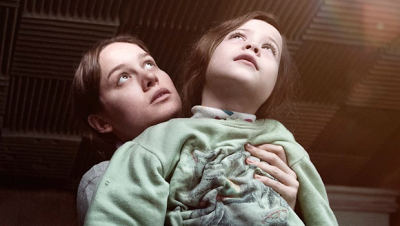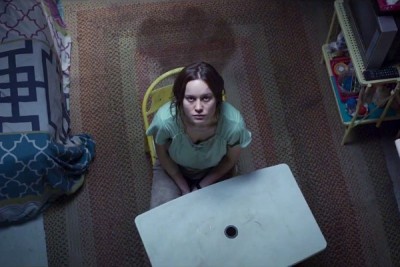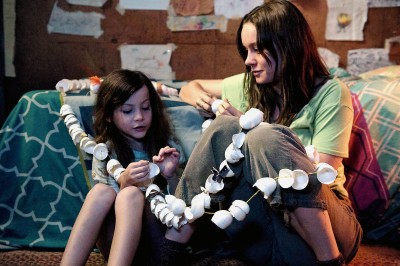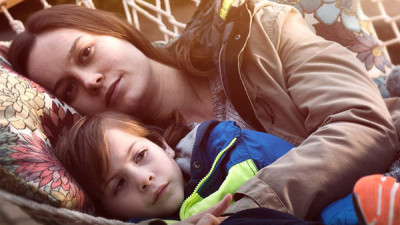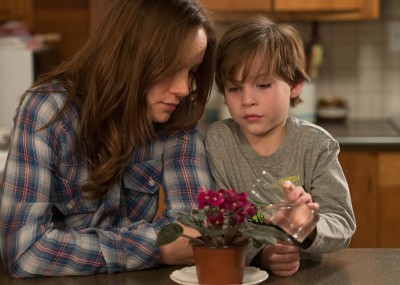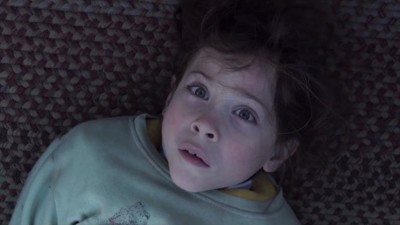When Emma Donoghue’s emotional telling of the story of a boy named Jack and his Ma hit the bestseller list in 2010, Donoghue already had a screenplay in the works. Wanting to challenge herself, and feeling the emotion that leaps off the page and into one’s very soul in reading the heart wrenching, gripping and ultimately joyous tear-jerker, Donoghue was at the ready when Hollywood came calling. Initially set completely within the confines of a tiny, windowless (but for an unreachable skylight), cement lined 11×11 room, on paper “Room” is told through the mind’s eye of five-year old Jack. But on screen, director Lenny Abrahamson together with cinematographer Danny Cohen take Donoghue’s screen adaptation which translates the interior monologue of a five-year old and elevates and expands the emotional heartbeat beyond that of Jack, filling the screen with dynamic indelible imagery and emotion, all brought to life by Brie Larson and newcomer Jacob Tremblay.
As we slowly learn, Ma has lived in “Room” for seven years; Jack for five. He was born in “Room”. It is the only world he knows. But Ma knows of the big outside world, a world from which she was stolen, only to be imprisoned in “Room”. To Jack, every item in “Room” is a friend. Wardrobe, Table, Chair, Sink, even Toilet. Ma has helped create this imaginary world for Jack as a means of mutual survival. She trades favors with her captor “Old Nick” in exchange for food and clothing, a tv and “Dora the Explorer” videos for Jack.
Shielding Jack from the truth of their situation until he becomes a “big boy” with his fifth birthday, the tide begins to turn for Ma and Jack as the young boy slowly begins to understand about the world, and then accept what he must help Ma do in order to become part of that big world.
A fan of Donoghue’s novel from the start, and always wary of film adaptations of literary works, this critic had doubts as to how effective an adaptation of “Room” would be. However, knowing that Donoghue herself had written the screenplay instilled hope, but that typically plays like a double edged sword with the author often becoming too precious with the novel and not expanding the story for visual aesthetics. Such is not the case with Donoghue. The script is emotionally expansive and thanks to Abrahamson’s visual construct, physically expressive and expansive as well.
Initially, there is the feeling of tedium as those unfamiliar with the novel may find themselves becoming agitated and annoyed at the slow repetitiveness unfolding. But with the first appearance of Old Nick during a late night appearance in the one room bunker, and no exposition or real dialogue to establish time and place, curiosity is unlocked and the audience is open to the possibility of post-apocalypse or war torn scavenging outside the locked door. And then expository dialogue kicks in as Ma begins to tell Jack stories of the real world. From that point on, the pieces come together quickly and in captivating fashion as not only are Ma and Jack in survival mode, but so is the audience. We feel their trauma and their joy.
And “feeling” the raw emotion of “Room” comes from powerful performances, starting with Jacob Tremblay. This is his film. Had Abrahamson miscast the role of Jack, the film would have fallen flat. As it stands, it soars with wide-eyed wonder and purity, thanks to young Jacob, and only gets better as the story progresses and (SPOILER ALERT if you haven’t read the book) Jacob has the chance to interact with people and not furniture and appliances. Experiencing the world through the wide eyed wonder of Jack is pure joy. On the flip side of that though, is the closed mindedness we see in the form of William H. of Macy’s character Robert and the inability of Ma (now going by her given name of Joy) to adapt as well as an inability to come to terms with her loss of control over every iota of her existence. These serve as perfect counters to Jack and Tremblay’s performance.
The dynamic of Tom McCamus’s Leo with Jacob Tremblay’s Jack enchants. (Leo is Grandma’s boyfriend since her divorce after Ma’s disappearance.) Little Jacob Tremblay is angelic innocence, uplifting the film and the viewer, something which is also metaphorically celebrated with Cohen’s lensing, most notably in some of Tremblay’s scenes with McCamus. At the same time, the fear Tremblay delivers in an escape sequence is palpable.
Great turn by Wendy Crewson who oozes tabloidesque sleaze with the very way she manipulates Donoghue’s brilliant dialogue for the “news reporter.” Telling subtext and commentary. A notable performance also comes from Amanda Bruce who, as Officer Parker, in a key scene as being the first individual contact Jack has with the outside world, resonates with genuine emotion. Joan Allen delivers a particularly emotionally resonant performance as Jack’s grandmother.
Disappointing, however, is Brie Larson. And it’s not that her performance is bad. Larson delivers a powerful and emotionally fractured, survivalist take on Ma. But, there is no growth in Larson as an actress; rather, there is a lot of emotional piggybacking by Larson to her work already seen in “Short Term 12.”
Superlative is the word to describe cinematographer Danny Cohen’s lensing and lighting. The physical POV drives the emotional tonal bandwidth of the film, while lighting and lensing within “Room” itself achieves a feeling of claustrophobia from Ma’s perspective but one of endless space and height from that of Jack; the open-ended wonders of all that the world has to offer. Cohen and director Abrahamson dazzle us with the juxtapositioned dichotomy, all to great emotional effect.
Make room in your heart for “Room”.
Directed by Lenny Abrahamson
Written by Emma Donaghue based on her novel of the same name
Cast: Brie Larson, Jacob Tremblay, Joan Allen, William H. Macy, Tom McCamus

